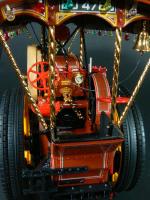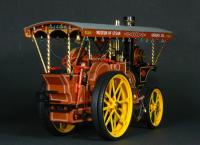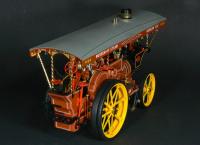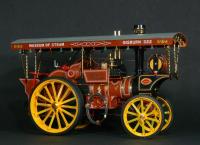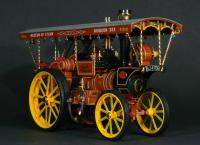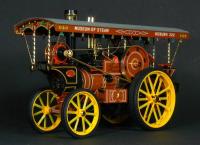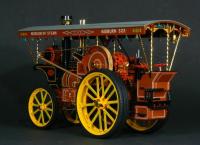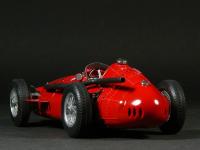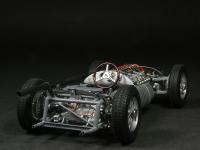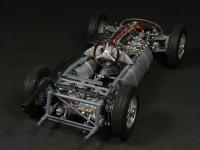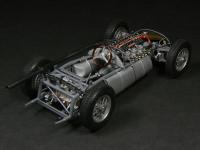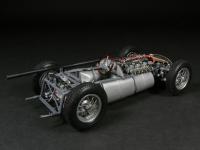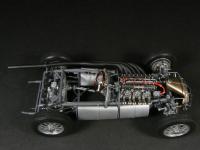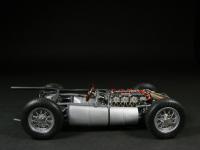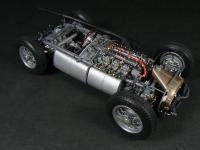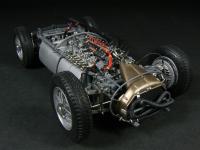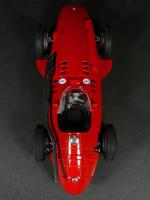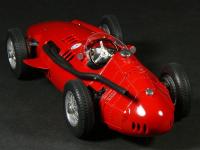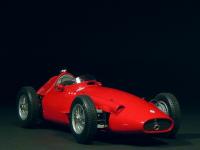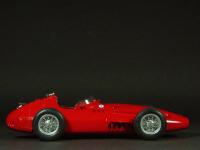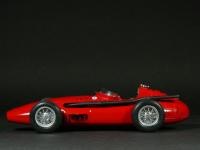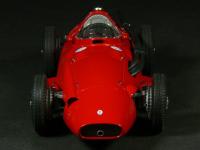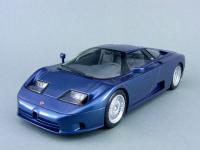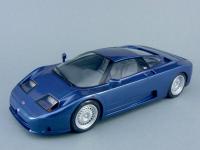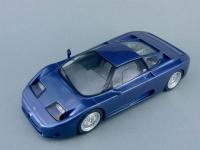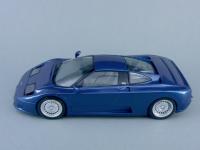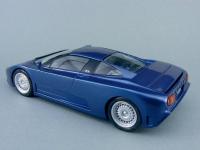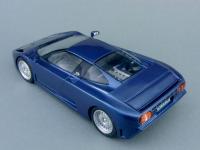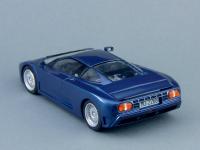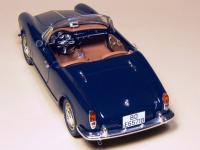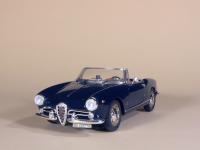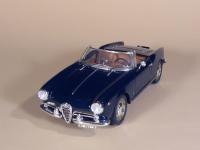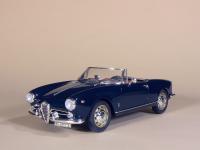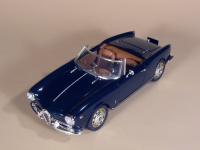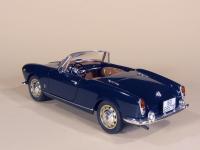-
Posts
880 -
Joined
-
Last visited
Content Type
Profiles
Forums
Events
Gallery
Everything posted by Plastheniker
-

Pete 359, finally done....
Plastheniker replied to tbill's topic in Model Trucks: Big Rigs and Heavy Equipment
Tom, even if I usually avoid dark colours on my models, this colour combination really works. Very nice detailing and execution! -
Even if italianità is a musical term - this fantastic car has italianità! And so does this beautifully executed model.
-

KW C500 OIL FIELD
Plastheniker replied to Swamp Dog's topic in Model Trucks: Big Rigs and Heavy Equipment
Outstanding model as all your models are. You show the difference between modeling and kit assembling. -

Maserati 250F - Grand Prix Champion 1957 1/20
Plastheniker replied to Plastheniker's topic in Model Cars
Thanks for the further comments! My next pair(s) of Casadio/Revival conversions will be the 1961 Ferrari 156 Sharknose and probably the 1924 Bugatti 35. I hope you will be interested again. -

Maserati 250F - Grand Prix Champion 1957 1/20
Plastheniker replied to Plastheniker's topic in Model Cars
Thanks for the feedback, each comment is appreciated! Sonny, no I am sorry. For many years I find taking pictures and making notes while building very disruptive - this was the reason why i stopped writing magazine articles. Moreover I built this model before digital cameras were standard and taking pictures became free. -
Thanks for the feedback. I am sorry for my late reply. Harry, I keep all instruction sheets of my models, so I am sure that there was no decal for the pinstriping on the wheels. There are raised lines on the wheels that could be used as guiding edges for a pen. BTW you look so young suddenly. Please tell us your secret. New shaver or botox? ... and not forgetting the outstanding car kits. I wonder why they were never re-released.
-
Hi, Up to the thirties steam trucks and steam road tractors were a common sight at least on European roads. Today particularly in England there is still a very strong interest in all kinds of vintage steam vehicles. Probably the most renowned English manufacturer of steam trucks and steam road tractors was Richard Garrett & Sons Ltd., Leiston, Suffolk. Their 1919 heavy road tractor, initially built for pulling trailers of a brickyard and later converted into a showman's tractor with additional current generator, was preserved by the English enthusiast Tom Varley and displayed at his steam museum. There it was nicknamed Pendle Princess. After Tom Varley's death the former kit manufacturer Bandai purchased the vehicle and made this beautiful kit. I suppose I built this model 30 or even 35 years ago. My memories of the build are almost completely gone. Nevertheless I am sure that building it was a pleasure, because Bandai kits were really outstanding.
-
Hi, Very roughly spoken the Maserati 250F was a modernized 1953 A6 SSG for the 1954 GP season. Compared f. e. with the technically sophisticated 1954 Mercedes W 196 it was technically very simple. Despite its simplicity it suffered from a lot of teething problems initially, and with only mediocre drivers it was not very successful. From the beginning, however, it was a well-balanced car. 1955 and 1956 Maserati improved the 250 F continuously, resulting f. e. in a significantly different appearance. In 1957 the 250F was reliable and competitive. Fangio, the best driver of the era (possibly ever), joined Maserati and won his fifth GP world championship. As usual I converted two of the crude Casadio/Revival kits. The 250F kit was not as disastrous as the Mercedes W154 or the Ferrari Sharknose, but crude enough to require significantly more than 1000 hours for both models. Particularly the chassis was so extremely simplified that it became almost more a scratch build than a conversion. Similar topics of mine: 1907 Fiat 130 HP Grand Prix Racer 1/20 http://www.modelcars...showtopic=75350 Auto Union Typ C - Grand Prix Champion 1936 1/20 http://www.modelcars...showtopic=76696 Mercedes W154 M163 - Grand Prix Champion 1939 1/20 http://www.modelcars...showtopic=79535 1951 Alfa Romeo Tipo 159 Alfetta - GP Champion 1951 - 1/20 http://www.modelcarsmag.com/forums/index.php?showtopic=81024
-
Harry, your colour choice is excellent. The disc wheels, the spats, even the whitewall tyres look great. I couldn't see anything crooked on the pictures, but anyway this is an old but useful trick to recognize blemishes during work: Looking hours and hours at the same object generates some kind of blindness for good or poor. Simply inspect your work in a large mirror, and it is as if you saw your own project for the very first time
-
A very nice build of a Tamiya kit with some shortcomings (years ago my kit had very poor, i. e. uneven, surfaces of the chromed parts).
-

1993 Bugatti EB 110 - The Almost Forgotten Super Car
Plastheniker replied to Plastheniker's topic in Model Cars
Thanks for all comments! I was told today that my Airfix kit was not a reboxed ROG kit because there were two completely different kits, one by Heller/Airfix and another by Revell/Monogram, the latter of rather poor quality. I hope that this information is correct. -
Harry, what an unusual and beautiful model! Subjects like this make a forum interesting. Excellent choice and immaculate execution!
-
Hi, About ten years before Volkswagen acquired the name "Bugatti" in 1998 there was an unsuccessful attempt to revive this legendary marque that had stopped making cars soon after the end of WW2. The result of this first attempt was the attractive and technically outstanding EB 110. On all markets, however, it failed completely: Maybe because it was manufactured in Italy without any recognizable relation to the original Bugattis, maybe because there was almost no dealer and service network, maybe because it was rather expensive without offering much more than its established competitors. Anyway production was stopped after a few years and approximately 100 vehicles. I suppose I built my model about 15 years ago. The Airfix kit was probably a reboxed ROG kit. As far as I remember it was a good but quite difficult kit. Of course as Bugattis most 1:1 EB 110 had metallic blue or solid blue paintworks.
-

revell routmaster
Plastheniker replied to bowtieboss's topic in Model Trucks: Big Rigs and Heavy Equipment
I have seen several finished kits, your model is certainly one of the best. Pictures would make your great workmanship probably even more evident without the reflections of the direct sunlight. BTW nice tag! -

ChevroletC-60 flat bed truck
Plastheniker replied to Arnd's topic in Model Trucks: Big Rigs and Heavy Equipment
Arnd, a really unusual model. I never saw such a cab before. Es ist schön zu sehen, daß wieder einmal jemand nicht nur schon hundertmal Gesehenes aus dem Kasten baut. Welcome, we hope to see more like this! -
Thanks for all further comments! BTW if you wonder what these two dots on top of the letter ü in the name Büssing are good for here is a simple (notn-scientific) explanation: Germanic languages as well as Finish, Hungarian and even Turkish have modified vowels mostly written as Ä/ä, Ö/ö and Ü/ü. They modify the pronounciation of the respective standard vowels. In German the standard vowel U/u is always pronounced like the vowel U/u in the English words bush (short) or rude (long). In German the modified vowel Ü/ü is always pronounced like the vowel U/u in the French words russe (short) or tu (long). Even if this is more than you ever wanted to know – now you could pronounce Büssing (and my first name Jürgen) correctly.
-

Scania 143H Flatbed
Plastheniker replied to tiking's topic in Model Trucks: Big Rigs and Heavy Equipment
Charles, this definitly one of the best weatherings I have ever seen. Most European modelers overdo weathering completely, but your subtle technique makes your model look exactly as a European workhorse looks in reality. The matching colour of the base makes it even more convincing. Really excellent! -
Thanks for your comments so far! I am really envious of those having owned (and driven!) such a beautiful car. Skip, as always in questions of automotive history you are right. The Protar instruction sheet said 1955, and in the pre-web era I had to rely on books. All books that I used, even a very comprehensive Alfa Romeo monograph by a renowned German author, state wrong years of manufacture in the captions of Giulietta Spider pictures (I have just checked this). Therefore I was mislead. BTW even in the web most captions are wrong. This is obviously correct: The Protar kit shows a 1959 Giulietta series 101 II. Its most significant features were windup windows, fake side vents, reflectors integrated into the backlights, a closed glove box. I am going to edit my topic if possible. Skip, thanks a lot!
-
Hi, if you ask people for the Italian car today the answer will be very likely Ferrari or Lamborghini. In the sixties or earlier, however, the answer would have been completely different. At least up to the beginning seventies Ferraris and Lamborghinis were so expensive and so unreliable that they were (at least in Europe) toys for a few super-rich enthusiasts completely unfit for more than occasional use. Maseratis were much more durable and reliable but on the same high price level. The Italian marque of those days was Alfa Romeo. Today it is hard to believe that Alfa Romeo built an incredible number of highly desirable and sometimes even breathtaking cars. The steep decline of Alfa Romeo around 1970 was caused by poor quality, incompetent managements, the interference of the Italian government and finally the takeover by Fiat. One of the most attractive post-war Alfas was the Giulietta/Giulia Spider. Introduced in 1955 as the 1.3 litre Giulietta it was renamed 1962 as the 1.6 litre Giulia. With a curb weight of less than 900 kg and up to 112 hp it was a fast car with excellent roadholding. I built my model from a Protar kit. Probably the same kit was sold by ROG some years later. My memories of the build are very vague. I suppose I built the kit about 15 years ago. I don't remember major issues (opposite to a disastrous Protar kit of the Mercedes W196 GP). Anyway the kit made a nice model of a very attractive 1:1 car.
-
A breathtaking car and a perfect model. Excellent job!



